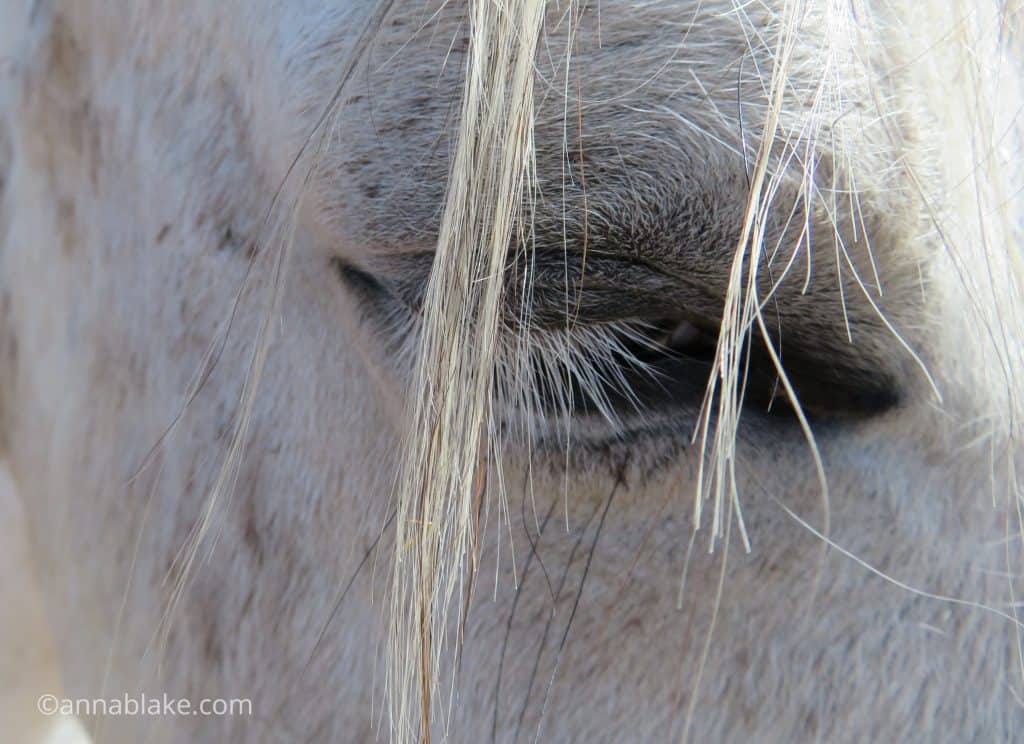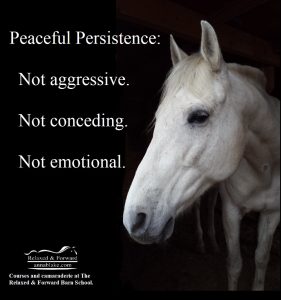
I’m not sure when I started sitting on horses, but I hadn’t started school. You couldn’t really call it riding. When my parents needed me out of the way, they put me on the back of a tall gray mare named Lady. We were in a pen, and she wandered about grazing. They left and did the work they needed to do. The only thing I remember for sure was how much I wondered what Lady thought. It was worth asking because my half-brother rode her for chores and routinely came into the house bruised and bloody. He would be spitting mad, saying Lady wouldn’t listen, and she needed to be taught a lesson. She might have thought he didn’t have a temperament for horses.
Lady fascinated me. I wanted to understand horses, and what the world looked like through their eyes. I didn’t want to be told stories about horses. We were not a family of fairy tales or children’s books. That benefited me. I was there in real time trying to understand their language. Not as a joke like Mr. Ed, and not in a musical way, like Dr. Doolittle. I was more like a baby Jane Goodall. I watched and listened, trying to see through their eyes, always asking, what does it mean to a horse? Before I had words to describe it, I wanted to speak horse like some people spoke French. Talking to horses? That’s as good as crazy for a 50s farm kid.
Sixty years later, I have more words, education, and experience, and the desire to understand horses continues as fresh as spring grass. I’m very aware that horses have emotions. We didn’t all think that back then. I know equally that horses and humans don’t share the same emotions in the same situations. But horses can suffer emotional confusion and challenges just like we do. It’s complicated.
It isn’t that I’m at odds with training or riding. I’m against misunderstanding horses. Throughout history, horsemanship has had two approaches. One is understanding horses, for the sake of the work to be done, be it transportation or plowing. The other focuses on the method of how to train, prioritizing the work, without considering the horse’s nature.
Training methods have always been attractive to us because we want a linear plan for getting what we want. We are process-oriented and want to believe if we do it right, the result is guaranteed. Like saying if I go to college, I will be rich and have a nice house. If I lose twenty pounds, I will meet the perfect life partner and we will live happily ever after. We want the clean path more than the jungle on either side. It’s sweet but shouldn’t we know better by now?
It’s just that we want something easy and quantifiable. Some training approaches try to put horses into boxes, not that they fit but because we wish they did. People are so quick to define their horse by training failures and personal disappointments. Rather than telling a fairy tale about horses that we want to be true, or making excuses for horses because of things that bother you, isn’t it time to finally not just listen but trust what the horse says in his body and behavior?
Oh, don’t blame yourself. For all the cheap talk about listening to horses, has it ever been clear what we should listen to? Bluntly, a training plan is only as successful as we are at listening to the horse’s emotional response to the methods. It isn’t what we train, but how. An understanding of a horse’s language, their Calming Signals, is the difference between a confident responsive horse and one that is unreliable and fearful. That should sound obvious, like old news.
The tricky part is that listening is nebulous and confusing, when all we want is a simple method, in three easy steps, for a perfectly behaved horse.
Meanwhile, horses are intelligent, with a strong memory and total awareness of their environment. They are born perfect and don’t think they need fixing. Define fixing as training and molding, correcting and manipulating. Horses are also born with a willingness to get along with humans. It’s their best and worst quality, depending on the humans they encounter. Ask yourself the important question. Am I getting the relationship with my horse that I want? Am I being the person I want to be for my horse?
So, I teach humans a language course called Calming Signals. It bears no similarity to fortune-telling or astrological readings. It doesn’t take second sight in any way, there is no woo-woo attached. The language is literal, and the requirement is only the ability to focus with a clear mind. Okay, that mind part can be challenging, but it should always be a requirement. Horses would benefit if we paid attention to their emotions, instead of being lost in a training manual while marching around with a whip. It’s the missing link in understanding our horses. It’s the difference in seeing horses as a unique and interesting, rather than a problem to be solved.
Maybe their mystery is what hooks us about horses. Listening to horses should be like reading a book we can’t put down. It would be less about us, our training success or failure, and more about following clues and finding hidden messages. It would be a daily attraction, that desire to sink into the narrative and be engaged as the story unfolds. We allow for plot twists and surprise endings. In that way, we prepare for their brilliance to rise above the pedestrian training we expect. What if horses were always meant to be a mystery?
It’s not a failure on our part. It doesn’t mean we give up training. We get better at listening and the more we understand, the more we stop thinking we own everything, including what it means to be a horse. Maybe we look at them with more curiosity than control. We see more potential for conversation rather than failed training.
Is the arrogance of thinking we know them a form of dominating them? Who are we to own the mind of another? Give up the frustration of thinking we can dominate a nebulous thing, and if you need to do mind control, use your own brain.
Sure, traditions are hard to quit. Long-held habits take time to change. What would we do if we weren’t correcting behavior we don’t like? We’d focus on our own communication skills. Let questions and praise be our language, because constant correction is soul-killing. We would finally understand that curiosity is genuine equine currency. Wouldn’t we be more interesting if we were less bossy? Ask Lady. Then take up exploration.
Start here: Ask the horse you’ve known their whole life, “Who are you today?” And then listen to their answer without correction.

…
If you appreciate what I do, please Subscribe to this blog or join us at The Barn School.
Anna Blake, Relaxed & Forward
Want more? Become a “Barnie.” Subscribe to our online training group with affirmative demonstration videos, audio blogs, daily quotes, free participation in “group lessons”, and live chats with Anna. Become part of the most supportive group of like-minded horsepeople anywhere.
Anna teaches ongoing courses like Calming Signals and Affirmative Training at The Barn School, along with virtual clinics and our infamous Happy Hour. Everyone’s welcome.
Visit annablake.com to find archived blogs, purchase signed books, schedule a live consultation, subscribe for email delivery of this blog, or ask a question about the art and science of working with horses.
Such great stuff here. The listening and communicating is the coolest part, but so far I am finding that the horse also seeks to know what exactly is the job here? What precisely am I supposed to be doing?and when they understand that (and they can do it) they feel good. So I have had to learn to “train” to a particular job or task when my nature used to be too dreamy or woo-woo for them. Finding that balance. Needless to say I am not a pro or competitor. Thoughts ?
My first thought is that you are honest and on the right path. Horses don’t like the romance or woo woo. Finding that balance is the art of being with horses. You’ll experiment, that will make you interesting. The sweet spot is how we behave when we muck, where we have a task, not that we care. BTW, that is the method whether we compete or not. It’s always about relationship. Thanks Karen, good listening.
“Listening to horses should be like reading a book we can’t put down“. This describes perfectly the relationship I have with my horses. It used to be some variation of “wow what page of the manual was This on?”
A new north. Thank you.
Thanks, Melissa. I never can tell the difference between riding and writing, or the difference between reading and writing. Thanks for noticing that part.
Why NOT let horses be a mystery? A wonderful delightful fantastic mystery. Reading the books, the manuals, taking classes, changing trainers, vets, barns, gear really doesnt give insight to how a horse IS. They are beings with their own minds & feelings.
I remember too many instances when I was a kid, of the whole domination attitude – really bad stuff. Any horse deserves so much more than that kind of treatment.
Really good post, Anna – thank you
Thanks, Maggie. How else can we be so fascinated after all this time??
Wonderful writing and bringing this to our attention – yet again. 🙂
The horses deserve better from us and I thank you for persevering with showing people there’s a different way.
Thanks, Cynthia. I think we do better all the time.
This one’s a knockout, Anna; thank you! I just love mysteries. Even when I can’t solve them, I’m happy to have my Loopy be Loopy and Bo be Bo!
Me, too! I just read a great mystery and saw the meaning of life, shbop.
Anna, I hope my comment isn’t a duplicate (I got the “are you a human” question again). And based on my recent lack of horse skills perhaps I’m not human.
I wanted to ask how we overcome our human rumination tendencies that block our ability to observe our horse‘s calming signals. If all is well, I make a good effort to observe rather than react around my horses. On the other hand, if I’m fuming about the fact that our pasture was cut the day before unpredicted torrential rains arrived, turning our horse hay to cow hay; well, I’m not such a disciplined observer. Do you have a magical mantra that I could use during my evolution into a better human?
Magical mantra? Gosh, I wish. it is the painstaking process of teaching ourselves to focus. It’s hard work. If it was easy, we’d all do it. That said, use affirmative training. Focus for small periods at first, build a new, relaxed habit. Then watch the horses to see what they think.
Do you suppose the spam block is trying to keep horses out with that human question?